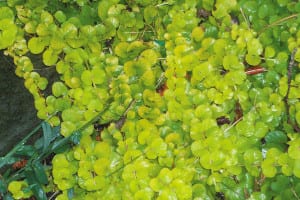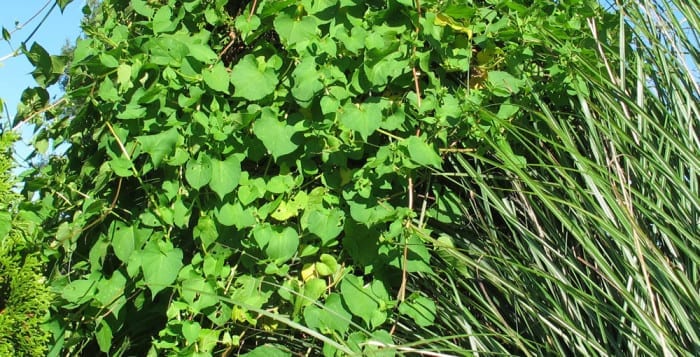Invasive vines — pull them while they’re little
By Ellen Barcel
Well, it’s fall. You’re doing your autumn cleanup before the garden goes to sleep for the winter. One thing you can do that will be very helpful is to remove any invasive vines you have now, while they’re small.
I’ve mentioned a number of times that plants can grow roots in the fall, even into December if there is no hard freeze. That means that if you leave invasive vines in the garden now, they will be getting a good start on next year’s growth, making it harder to remove.
So, what invasive vines should you be removing now? And, are there any native, but pesky, vines you may want to remove now?
Wineberries
One of the most prolific and nasty vines that volunteer in the garden is the wineberry. Wineberries were introduced into the country from Asia to possibly be crossed with raspberries. But, wineberries (Rubus phoenicolasius) are extremely invasive, taking the place of native plants. They pop up all over. I’ve even pulled them out of planters. Make sure you are wearing gardening gloves when you pull this nasty one since the stems are filled with thorns. I found this out the hard way many years ago.

While you might like the idea of eating wineberries — they are edible — they’re only okay and are not as flavorful as raspberries. So, if you want raspberries, plant them and pull out the wineberries. Due to their extremely invasive nature, they are on Suffolk County’s Do Not Sell List.
Oriental bittersweet
Oriental bittersweet (Celastrus orbiculatus) is a woody vine that volunteers easily in the garden. It was introduced into the United States in the late 1800s and has spread extensively. It seems to like virtually any environment — climate, soil conditions, fertilizer or lack thereof — meaning that it easily competes with native plants. Birds and small mammals eat the berries and spread the seeds, as happens with the wineberries. One vine I didn’t notice grew up in my garden behind some other plants and actually broke my wooden fence. It’s on the Do Not Sell List for good reason.
Creeping Jenny
Creeping Jenny (Lysimachia nummularia) is a low-growing vine with roundish chartreuse leaves. It spreads rapidly, even into grass. It does well in zones 3 to 8. An evergreen perennial that favors wet ground, it is native to Europe but was introduced into the United States where it has spread far and wide. It roots wherever a node touches the soil. It will resprout from the roots if pulled out. Yes, this one too, is on the Do Not Sell List.
Other vines on the list include kudzu, sweet autumn clematis, some varieties of honeysuckle and mile-a-minute weed. Pull all of these out whenever you see them.
Management List
There are a number of vines that can be legally propagated and sold in Suffolk County but are invasive as well. The county suggests that they not be planted (Management List). They include chocolate vine, Asian wisteria (I personally think this one should be banned), morning glory, English ivy (another one that wants to take over the world), periwinkle, silver lace (or fleece vine) and ground ivy.
For a detailed list of invasive plants of the United States go to www.invasiveplantsatlas.og.
Native vines
Wild grapes (Vitis) are native to North America. Remember that the Vikings called North America Vinland. But, while they are native, they can be a real nuisance. A gardening friend of mine has wild grapes growing up a number of her shade trees and have really taken over. There are a number of species, but most bear grapes that are not suitable for making wine. She notes, however, that the birds seem to enjoy them.
False buckwheat (Polygonum scandens) is also a native of North America and, as the wild grapes, can be a real nuisance to the home gardener. It grows wild from Canada in the north to Florida in the south and as far west as Wyoming and Colorado.
If you can, remove wild grapes and false buckwheat whenever possible. Although native, they do take over.
Ellen Barcel is a freelance writer and master gardener. Send your gardening questions to [email protected]. To reach Cornell Cooperative Extension and its Master Gardener program, call 631-727-7850.







